 Court of Wanderers (Silver Under Nightfall, #2) by Rin Chupeco
Court of Wanderers (Silver Under Nightfall, #2) by Rin Chupeco Format: eARC
Source: supplied by publisher via Edelweiss
Formats available: hardcover, ebook, audiobook
Genres: Dark Fantasy, epic fantasy, fantasy, fantasy romance, Gothic, horror, steampunk, vampires
Series: Reaper #2
Pages: 448
Published by Gallery / Saga Press on April 2, 2024
Purchasing Info: Author's Website, Publisher's Website, Amazon, Barnes & Noble, Kobo, Bookshop.org, Better World Books
Goodreads
Remy Pendergast and his royal vampire companions return to face an enemy that is terrifyingly close to home in Rin Chupeco’s queer, bloody Gothic epic fantasy series for fans of Samantha Shannon’s The Priory of the Orange Tree and the adult animated series Castlevania.
Remy Pendergast, the vampire hunter, and his unexpected companions, Lord Zidan Malekh and Lady Xiaodan Song, are on the road through the kingdom of Aluria again after a hard-won first battle against the formidable Night Empress, who threatens to undo a fragile peace between humans and vampires. Xiaodan, severely injured, has lost her powers to vanquish the enemy’s new super breed of vampire, but if the trio can make it to Fata Morgana, the seat of Malehk’s court—dubbed “the Court of Wanderers”—there is hope of nursing her and bringing them back.
En-route to the Third Court, Remy crosses paths with his father, the arrogant, oftentimes cruel Lord of Valenbonne. He also begins to suffer strange dreams of the Night Empress, whom he has long suspected to be Ligaya Pendergast, his own mother. As his family history unfolds during these episodes, which are too realistic to be coincidence, he realizes that she is no ordinary vampire—and that he may end up having to choose between the respective legacies of his parents.
Posing as Malek and Xiaodan’s human familiar, Remy contends with Aluria’s intimidating vampire courts and a series of gruesome murders with their help—and more, as the three navigate their relationship. But those feelings and even their extraordinary collective strength will be put to the test as each of them unleashes new powers in combat at what may be proven to be the ultimate cost.
My Review:
I loved this second book in the Reaper duology even more than I loved the first book, Silver Under Nightfall. Which means that it is going to be damn near impossible to keep my SQUEE under enough control to write this review.
But then again, I loved this so hard that I have literally nothing truly serious to say, except to tell people to go out and read this duology and to start with Silver Under Nightfall and be prepared to forgo sleep until you’ve finished the set.
The story in Court of Wanderers picks up right after the ending of Silver Under Nightfall, and everything that happened in that first book is part of the setup for this second. So my one very serious thing to say is to start with Silver Under Nightfall to get acclimated to this intricately designed and convoluted world where the good humans are working with the good vampires, the bad vampires are killing the bad humans and someone or something is maneuvering behind the scenes on both sides for dastardly reasons of their own.
Because divide and conquer has been a sound strategy since the dawn of, well, strategy.
At the heart of this truly epic dark fantasy are Malekh, Xiodan and especially Remy. Malekh and Xiodan are vampires at the center of seemingly ALL the power plays among their people. A people who are distrustful of each other and seem to hold humans in contempt. But are forced to or hopeful of or a bit of both regarding an alliance with at least some humans in order to fight a common enemy that is targeting them both with armies of infectious, unkillable monsters.
(And yes, anything that a vampire thinks is a monster is pretty damn monstrous – as are the people (for loose definitions of ‘people’) controlling them.)
Remy Pendergast, the point of view character for the story, is a garden-variety human. Or so he believes, in spite of all the rumors to the contrary he grew up with and was constantly reviled for. His father leads the human armies on behalf of the Alurian Queen Ophelia.
His father, quite frankly, is also a bastard – the marital status of HIS parents notwithstanding.
Remy was supposed to be his father’s spy among the vampire courts. Instead, Remy has found the first place he could ever call home. A place where he is respected, appreciated, and most definitely loved. By Malekh and Xiodan, the leaders of the third and fourth vampire courts, who want to make him their acknowledged third, whether he remains human or lets himself be turned.
But Remy isn’t quite the mere human that he believed himself to. Then again, quite a few of the things he believed and the people he believed in are not exactly what he believed them to be, either.
The war that Remy is at the forefront of, on both sides at the same time, will test his courage, his mettle, his resolve – and most especially, his heart.
What comes out the other side – intact or otherwise – is for Remy to discover. If he survives – and if his world survives with or without him.
 Escape Rating A++: The SQUEE is strong with this review. Let’s get into at least a bit of the why of that fact.
Escape Rating A++: The SQUEE is strong with this review. Let’s get into at least a bit of the why of that fact.
The comparison that keeps being made in the blurbs is to Castlevania. I’ve never played the game, so I can’t say if that’s on point or not. What is very much on point – and not just the pointy fangs of the vampires themselves, is that the Reaper duology does a fantastic – no pun intended – job of combining the battle of good vs. evil that so often lies at the heart of epic fantasy with epic fantasy’s complex worldbuilding AND its underlying thread of very long, downright historical forces teeing up to fight the same battles over and over again.
At the same time, and I think this is where the Castlevania reference comes in, some of the prime movers and shakers in this world are vampires. And it has been observed, at least by this reader, that vampire politics tend to run towards exceedingly long games and even longer grudges because those original movers and shakers are still doing the moving and the shaking down through the millennia. It’s difficult to get a fresh start when the people who need it are battling not against institutional memory or country-founding ethos but against actual memory – usually in worlds where therapy is not remotely a thing.
A big part of what is ultimately uncovered, the evil at the heart of this world, is that the forces arrayed have been maneuvering on the down low for longer than the short-lived humans could possibly imagine – not that plenty of them haven’t either been caught up in it or killed by it or both over the centuries.
Our point of view on those discoveries, and on those centuries of underhanded and underground dealings, is Remy Pendergast. In Silver Under Nightfall, we’re with Remy as he’s used and abused by everyone around him in the human world, and we follow his perspective as he learns that the vampire courts are not much like he’s always been taught. And that he has considerably more value as a person than the human courts – particularly his own father – have ever led him to believe.
As Court of Wanderers begins to unravel the plots and counterplots that have set up the epic confrontation, Remy learns that so much of what he’s been taught to believe just ain’t so. We feel for him as his illusions are destroyed, as some of them get rebuilt, and as the layers of the whole onion of his life peel back with tears every step of the way. We get caught up in his journey as well as the battle yet to come and its multiple horns of dilemma consequences.
I got caught up in this story for Remy, because it was impossible not to feel for him, and because the way that his continual discoveries of how the world REALLY works as opposed to how he thought it did gave me a captivating and compelling ‘in’ to this complex world.
I stuck around because as the romance – and it is absolutely a romance – between Malekh, Xiodan and Remy gets deeper I found myself feeling for them, both in the romance AND for the centuries of trauma they had experienced and the way that their world was damaged and how desperately they wanted to fix it in spite of the forces arrayed against them.
I was fascinated with the way that the good vs. evil battle that has been fought through the whole story wasn’t reduced in any way to the easy fixes. Although many people at the beginning believed it was vampires vs. humans, and the villains were trying hard to make that point stick, in the end there was good among both and evil among both and deception on all sides. And redemption as well.
When I closed the final page of Court of Wanderers, I left this world with a deeply conflicted reaction. The ending of this book, and this duology, is utterly right for the story that was told within. The mix of the bitter of loss with the sweet of possibilities was, in the immortal words of Goldilocks, ‘just right’. But I’m deeply sad that this marvelous story is over, and that I won’t get to see the outcome of the life-altering choices that Remy has before him – and I desperately want to know.
Maybe I’ll find out in some future story by this author. I hope so. I KNOW that I’ll be all in on their next adult fantasy, whenever it appears, because Silver Under Nightfall and Court of Wanderers constitute a tale that I’m going to remember for a long, long time.

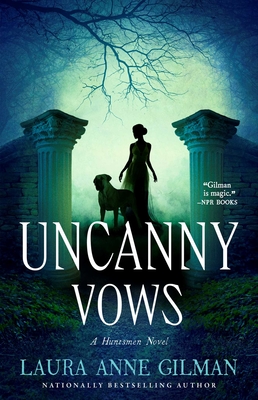 Uncanny Vows (Huntsmen, #2) by
Uncanny Vows (Huntsmen, #2) by 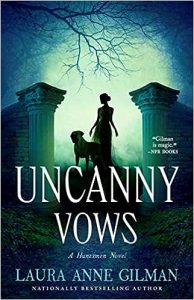 If the idea that the Harker family is somehow involved with the things that go bump in the night feels familiar but you can’t quite remember why, it’s because it IS familiar. Jonathan Harker got himself mixed up with a famous vampire in a little place called Transylvania a mere couple of decades before we first met Aaron and Rosemary Harker in the first book in the
If the idea that the Harker family is somehow involved with the things that go bump in the night feels familiar but you can’t quite remember why, it’s because it IS familiar. Jonathan Harker got himself mixed up with a famous vampire in a little place called Transylvania a mere couple of decades before we first met Aaron and Rosemary Harker in the first book in the 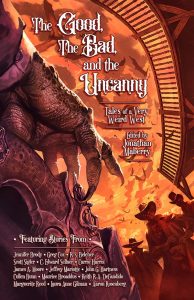 Escape Rating B+: So far, at least, the
Escape Rating B+: So far, at least, the  At the same time, the heavy lifting of setting up the world and the series has already been done in that first book, so this one is able to sink its teeth into the case from the very first page – and that they drive off in Aaron’s rented ‘automotive” gets things going that much faster, while Rosemary’s dislike of the speed, the dust, and Aaron’s relative inexperience driving the thing adds a bit of lightness to what is otherwise a rather dark story of obsession and possession.
At the same time, the heavy lifting of setting up the world and the series has already been done in that first book, so this one is able to sink its teeth into the case from the very first page – and that they drive off in Aaron’s rented ‘automotive” gets things going that much faster, while Rosemary’s dislike of the speed, the dust, and Aaron’s relative inexperience driving the thing adds a bit of lightness to what is otherwise a rather dark story of obsession and possession. Firebreak by
Firebreak by  Escape Rating A+: It’s not about the game. It’s about the world that the game lets everyone escape from while packaging and selling the war – and every control and draconian measure that goes along with it – to everyone at the same time.
Escape Rating A+: It’s not about the game. It’s about the world that the game lets everyone escape from while packaging and selling the war – and every control and draconian measure that goes along with it – to everyone at the same time. The way that Firebreak DOES link to
The way that Firebreak DOES link to 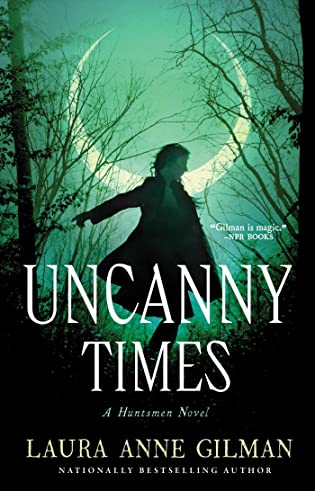 Uncanny Times (Huntsmen #1) by
Uncanny Times (Huntsmen #1) by 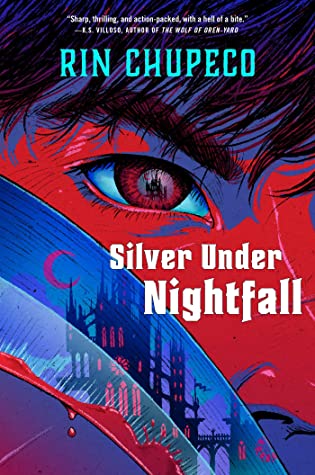 Silver Under Nightfall by
Silver Under Nightfall by  Gutter Mage by
Gutter Mage by 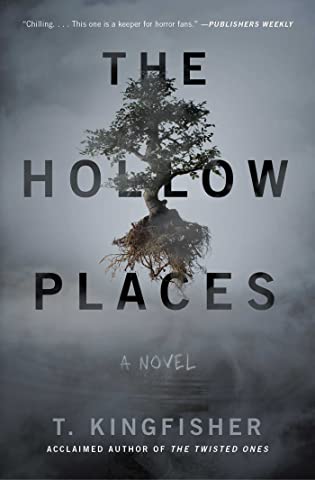 The Hollow Places by
The Hollow Places by 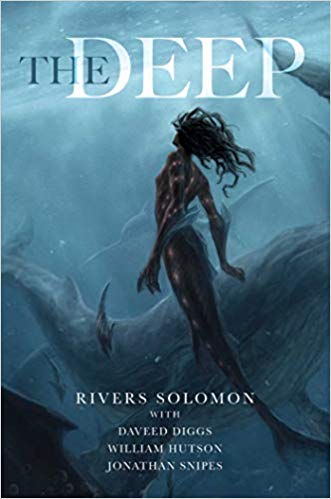 The Deep by
The Deep by 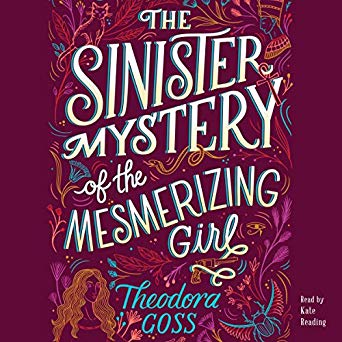 The Sinister Mystery of the Mesmerizing Girl by
The Sinister Mystery of the Mesmerizing Girl by 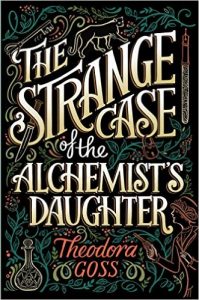 The series began, back in
The series began, back in 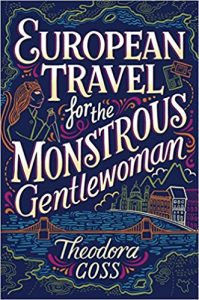 When I describe this book to people, it’s by way of the characters. Think about it. Dr. Jekyll’s daughter, Mr. Hyde’s daughter, Dr. Moreau’s daughter, Dr. Frankenstein’s daughter, the Poisonous Girl (from a story by Nathaniel Hawthorne if you’re wondering), Dr. Van Helsing’s daughter, the Mesmerizing Girl of the title (I’m not sure what story she is from but I bet there’s one somewhere – unless she’s Alice as in
When I describe this book to people, it’s by way of the characters. Think about it. Dr. Jekyll’s daughter, Mr. Hyde’s daughter, Dr. Moreau’s daughter, Dr. Frankenstein’s daughter, the Poisonous Girl (from a story by Nathaniel Hawthorne if you’re wondering), Dr. Van Helsing’s daughter, the Mesmerizing Girl of the title (I’m not sure what story she is from but I bet there’s one somewhere – unless she’s Alice as in 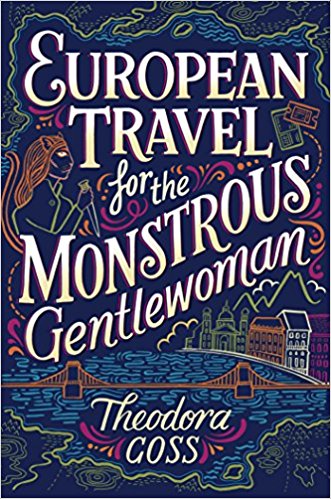 European Travel for the Monstrous Gentlewoman by
European Travel for the Monstrous Gentlewoman by 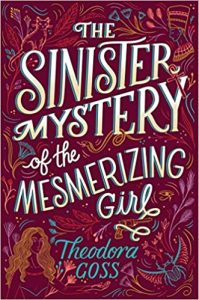 About Irene, she’s the perfect “mentor” figure for this series. If her name sounded familiar, it should. Irene Norton, nee Irene Adler, was THE woman in the Sherlock Holmes stories, the only woman ever to get the better of him. Holmes is out of the action in this one – appropriately so – and it is time for a woman to take up the reins. Irene is perfect for this role because unlike Holmes, Irene is used to working from the shadows. The members of the Athena Club do not need someone to protect them, a role that Holmes and Watson constantly try to assume. Irene enables them and lets them do their work.
About Irene, she’s the perfect “mentor” figure for this series. If her name sounded familiar, it should. Irene Norton, nee Irene Adler, was THE woman in the Sherlock Holmes stories, the only woman ever to get the better of him. Holmes is out of the action in this one – appropriately so – and it is time for a woman to take up the reins. Irene is perfect for this role because unlike Holmes, Irene is used to working from the shadows. The members of the Athena Club do not need someone to protect them, a role that Holmes and Watson constantly try to assume. Irene enables them and lets them do their work.